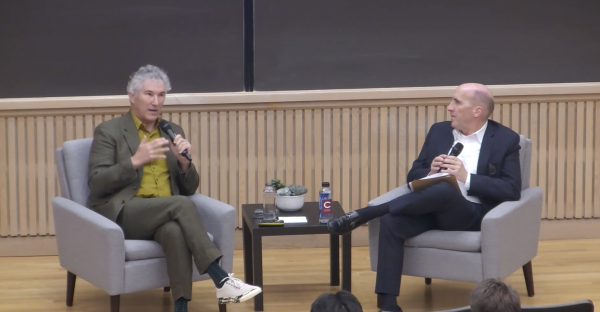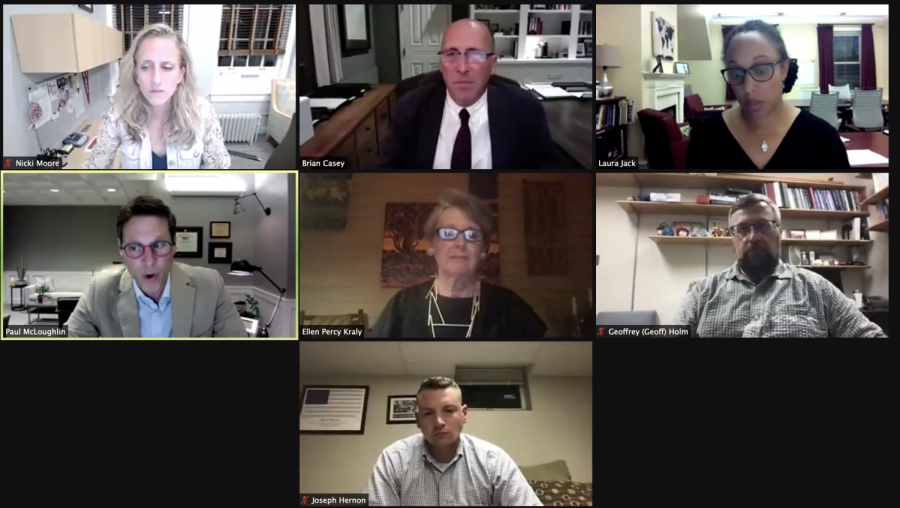As Delta Variant Causes Nationwide Concern, Administration and Task Force Clarify Return to Campus Policies at Town Hall
University administration and the Task Force on the Re-Opening of the Colgate Campus held a town hall for students and families on Thursday, Aug. 12, to clarify return to campus policies ahead of students’ arrival in the coming weeks. As the spread of the Delta variant causes much of the country to move back into tighter restrictions, Colgate recently instituted a mask recommendation for indoor public spaces and for when social distancing is not possible after Madison county’s transmission status raised from moderate to substantial. The town hall addressed the dynamic nature of Colgate’s plans and provided a basis of the University protocols and the vaccine requirement, particularly for new students and their families.
“We really think the universal vaccine requirement is the best way to ensure the safety of our faculty, staff and students. In thinking about this community, we need to think about those members of the community that cannot be vaccinated,” task force co-chair and Associate Professor of Biology Geoff Holm said during the webinar, held over Zoom.
According to the task force and the Health Analytics dashboard, the Colgate community vaccination rate stands at 93.9%. In Madison County, 51.4% of the total population is vaccinated, according to the Center for Disease Control.
The University has a supply of Johnson & Johnson (J&J) vaccines that they will provide upon arrival to students who were unable to get vaccinated, including international students from countries without widespread vaccine access.
Forty students, comprising 1.8% of the campus population, have received vaccination exemptions for religious or medical reasons, according to the panelists. These students will be required to receive testing on a weekly basis and will also be required to wear masks at all times unless eating, drinking or in a private space. In response to questions, panelists said that Colgate will not release the vaccination status of students to their roommates, saying only Student Health Services has private medical information such as vaccination status.
“There is a vaccine requirement. There’s no ambiguity about it. Unless you have a religious or medical exemption — and you do have to go through a process to receive this exemption — all students, faculty, and staff are required,” University President Brian Casey added during the Q&A section.
Regardless of vaccination status, all students will be tested with rapid antigen tests immediately upon their arrival to campus, and again 5-7 days later. Until they receive a negative result on their second test, all students are expected to wear face coverings in indoor public spaces and spaces where distancing is not possible.
In terms of mask-wearing in the classroom, those guidelines are up to the discretion of the faculty member who will also have the ability to change these guidelines at any point throughout the semester, Ellen Percy Kraly, Interim Dean of the Faculty and Provost, said.
Mask wearing will be required while on the Colgate cruiser, in Student Health Services and at testing locations.
All classes will be held in person and faculty are required to have an in-person option for office hours. Faculty will still have the option to conduct office hours virtually if they please. Kraly stressed both the safety of the community and a return to the normal, in-person education that Colgate values so highly, noting, “Goodwill and dedication are there from our faculty to work with you, our students, so our classes will be conducted in person.”
Certain spaces, such as Case Geyer Library, may require mask-wearing in particular locations, which will again be up to the discretion of the faculty or staff member responsible for that particular area, especially if interacting closely with students.
As of now, there will not be campus-wide surveillance testing.
“We have to weigh expenditures, not just in terms of money but in terms of infrastructure, time and staff it takes,” Holm said. “The CDC is not currently recommending testing of asymptomatic, vaccinated individuals. We are not expecting to be in a zero-covid space, that’s just not feasible. We will be monitoring symptomatic students and will have rapid tests available. With the testing of unvaccinated and immunocompromised individuals, this will give us a good handle on the situation.”
And undoubtedly one of the biggest questions on students’ minds: social gatherings. Panelists from the administration said they do not have any intention of restricting gatherings. Social hosting will not be permitted until the end of the add-drop period, which is a pre-pandemic policy, Dean of the College Paul McLoughlin noted.
With the return of Vice President for Communications Laura Jack’s Colgate Together email updates, the University has employed different language in their COVID-19 policies, including “recommended,” “expected” and “required” actions.
“We have talked a lot about the utility of requirements, expected, recommendations, and we will define those terms in an upcoming Colgate Digest. Many members of our community, many of them have children who cannot be vaccinated because they are under 12 years of age, so it’s important for us to think about this place as a place of public health, and having students think about their place in their community. We do want to walk away from heavy enforcement space, so students can make their decisions, and understand that this is a part of Colgate education potentially moving forward,” McLoughlin said.
The anonymous reporting hotline for coronavirus/Commitment to Community Health violations will be removed, while the pre-pandemic anonymous reporting system for incidents and concerns will remain.
Holm added that he is hopeful we can move towards a “pedagogical” space, rather than a space of “heavy enforcement.” McLoughlin added, “I can say that all of our faculty, staff and campus safety officers are very excited to move to this space and rebuild a positive relationship with our students,” potentially in reference to the strained relationships between students, campus safety and the administration last year due to violations, stringent requirements and consequences.
Additionally, there are no restrictions on travel. The task force stressed that due to the wide availability of a vaccine, Fall break and Thanksgiving break will run as planned with no universal quarantine requirements or testing (as of now) for a return to campus following these breaks. Homecoming Weekend and Family Weekend will also occur this semester.
All dining spaces, classrooms and public spaces will be returning to normal capacity limits. Athletics will also begin to allow spectators at all games.
“Last year we were successful because we had a very robust plan…now starting with vaccinations. We have this multiple-layered plan. And we are doing the best we can. We want you back on campus, we want to hear you laughing with each other at events…” Casey added.
If students or family members have follow-up questions, they can email covid19@colgate.edu.
Nicole Dienst is a senior from Westport, CT, studying English, economics and environmental studies. Prior to serving as Executive Editor, she has held...





